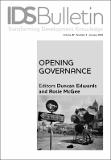When Does the State Listen?
| dc.contributor.author | Loureiro, Miguel | |
| dc.contributor.author | Cassim, Aalia | |
| dc.contributor.author | Darko, Terence | |
| dc.contributor.author | Katera, Lucas | |
| dc.contributor.author | Salome, Nyambura | |
| dc.coverage.spatial | Ghana | en |
| dc.coverage.spatial | Kenya | en |
| dc.coverage.spatial | South Africa | en |
| dc.coverage.spatial | Tanzania | en |
| dc.date.accessioned | 2016-01-11T09:57:49Z | |
| dc.date.available | 2016-01-11T09:57:49Z | |
| dc.date.issued | 2016-01-11 | |
| dc.identifier.issn | 1759-5436 | |
| dc.identifier.uri | https://opendocs.ids.ac.uk/opendocs/handle/20.500.12413/7690 | |
| dc.description.abstract | In this article, we look at four cases of key historical policies in Ghana, Kenya, South Africa and Tanzania to examine how states engage with citizen voices. The policies all took place in contexts of political change and major junctures of democratisation. We identify three kinds of moments when the state listens: hearing moments, when it engages with citizen voices but does not change the way it acts; consultation moments, when it engages with citizen voices through two-way dialogue, resulting in one-sided action; and concertation moments, when coalitions between reform-minded officials and politicians and organised citizen voices engage in two-way dialogue and action for accountable governance. Concertation moments occurred when there was a shared sense of urgency and a common goal across state and non-state actors, and despite different understandings of accountable governance. But concertation moments are also laborious and temporary, part of larger, ever-changing policy processes, and often states revert to consultation or hearing. | en |
| dc.language.iso | en | en |
| dc.publisher | Institute of Development Studies | en |
| dc.relation.ispartofseries | IDS Bulletin;47.1 | |
| dc.rights | This is an Open Access article distributed under the terms of the Creative Commons Attribution 4.0 International licence, which permits unrestricted use, distribution, and reproduction in any medium, provided the original authors and source are credited. http://creativecommons.org/licenses/by/4.0/legalcode | en |
| dc.rights.uri | http://creativecommons.org/licenses/by/4.0 | en |
| dc.title | When Does the State Listen? | en |
| dc.type | Series paper (IDS) | en |
| dc.rights.holder | Institute of Development Studies | en |
| dc.identifier.team | Power and Popular Politics | en |
| dc.identifier.doi | 10.19088/1968-2016.106 |
Files in this item
This item appears in the following Collection(s)
Except where otherwise noted, this item's license is described as This is an Open Access article distributed under the terms of the Creative Commons Attribution 4.0 International licence, which permits unrestricted use, distribution, and reproduction in any medium, provided the original authors and source
are credited. http://creativecommons.org/licenses/by/4.0/legalcode


